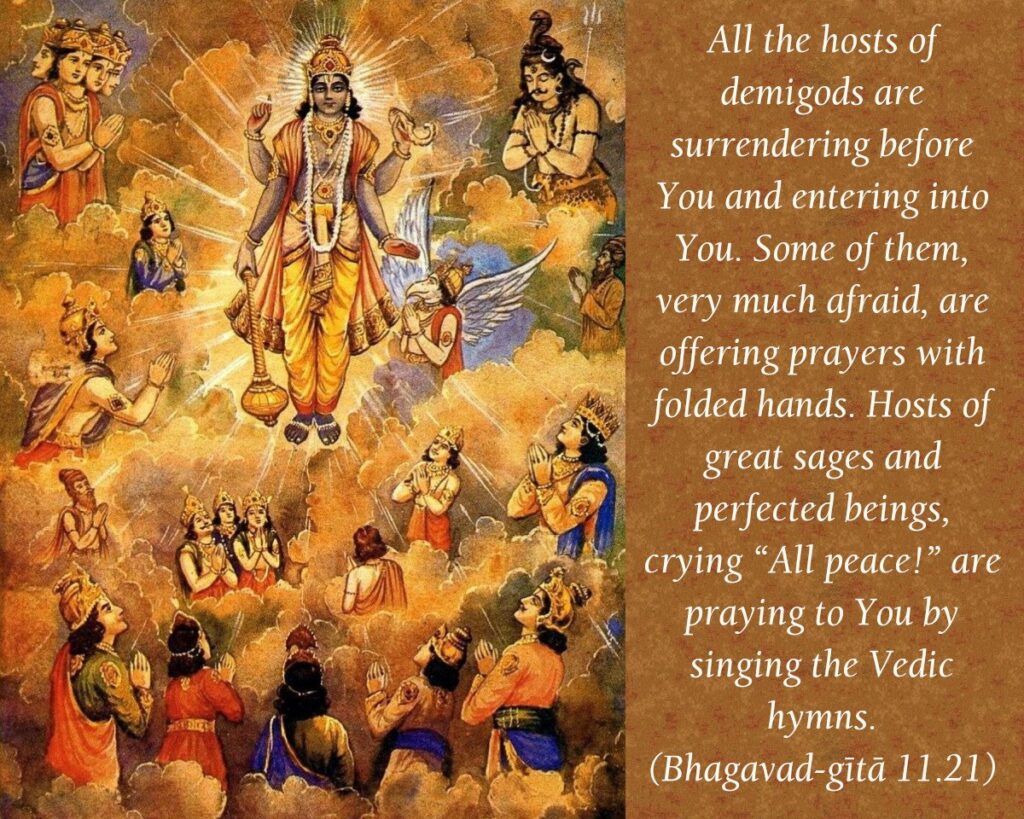अमी हि त्वां सुरसङ्घा विशन्ति
केचिद्भीता: प्राञ्जलयो गृणन्ति |
स्वस्तीत्युक्त्वा महर्षिसिद्धसङ्घा:
स्तुवन्ति त्वां स्तुतिभि: पुष्कलाभि: || 21||
amī hi tvāṁ sura-saṅghā viśhanti
kechid bhītāḥ prāñjalayo gṛiṇanti
svastīty uktvā maharṣhi-siddha-saṅghāḥ
stuvanti tvāṁ stutibhiḥ puṣhkalābhiḥ
amī—these; hi—indeed; tvām—you; sura-saṅghāḥ—assembly of celestial gods; viśhanti—are entering; kechit—some; bhītāḥ—in fear; prāñjalayaḥ—with folded hands; gṛiṇanti—praise; svasti—auspicious; iti—thus; uktvā—reciting; mahā-ṛiṣhi—great sages; siddha-saṅghāḥ—perfect beings; stuvanti—are extolling; tvām—you; stutibhiḥ—with prayers; puṣhkalābhiḥ—hymns
Translation:
Into Thee enter these hosts of gods, and some in fear extol Thee with folded hands. And bands of Rishis and Siddhas exclaim, “May there be peace!” and praise Thee with splendid hymns.
Commentary:
Svasti: “May it be well to all the worlds,” is always the prayer of great souls. They have so intimately found their unity with the world that they wish for its welfare with all their heart and soul. “Svasti prajabhyah“-should be the universal prayer of all aspirants.
Stuvanti: With sublime hymns and songs, the Rishis and Siddhas extol the Lord. When the wise thus express their devotion through prayer, is it not the duty of common mortals to follow their example?
Bhagavad Gita: Chapter 11 🔻 (55 Verses)
| 01 | 02 | 03 | 04 | 05 | 06 | 07 | 08 | 09 | 10 |
| 11 | 12 | 13 | 14 | 15 | 16 | 17 | 18 | 19 | 20 |
| 21 | 22 | 23 | 24 | 25 | 26 | 27 | 28 | 29 | 30 |
| 31 | 32 | 33 | 34 | 35 | 36 | 37 | 38 | 39 | 40 |
| 41 | 42 | 43 | 44 | 45 | 46 | 47 | 48 | 49 | 50 |
| 51 | 52 | 53 | 54 | 55 |
